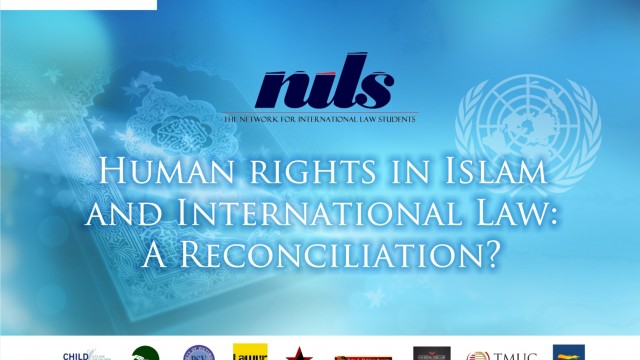Network of International Law Students (NILS) Holds Panel Discussion Seeking To Reconcile Human Rights Under Islam & International Law
Against a contemporary backdrop of Islamophobia and a never-ending, ever-spiraling ‘war on terror’, it is essential that we as Pakistanis, as Muslims, as individuals capable of reasoned argumentation counter the narrative that tends to judge 1.6 billion strong community based on the actions of a small minority of extremist ideologues whose version of Islam is anything but true to the quintessence of the religion. It was with this aim of removing misunderstandings against Islam portrayed as a barbaric savage philosophy that NILS Pakistan organized a discussion that engaged law students, legal researchers and academics in a discussion that explores the real core of Islam – beyond its representation in western media and beyond the actions of the small minority who have to come to hijack a religion that promotes love, tolerance and equality.
As a youth-based initiative, NILS Pakistan recently organized its first plenary discussion in Islamabad on 8th March 2016 in collaboration with The Millennium University College (TMUC). The panel explored the legal precedent for western human rights principles and norms within Islamic law and historical practice. Mr. Oves Anwar, Team Lead at Conflict Law Centre at The Research Society of International law and Ms. Humeria Maseehuddin (Criminologist, Victomologist and Islamic legal scholar) together helped an audience of young law students, lawyers, professors and researchers through journey that juxtaposes Shariah and International Law on the question of human rights with a particular view to first and second generation human rights as well as international humanitarian law (IHL).
As the experts touched upon hitherto unexplored affinities that exist between international legal instruments such as the Universal Declaration on Human Rights (1948) and the two foremost sources of Shariah – the Holy Quran and Hadith/Sunnah, the perspective that was being pushed is one that perhaps the hour most truly needs, one that seeks to clear the fog that has obfuscated the understanding of Islam as a set of legal, moral and ethical principles.
The panelists were also confronted with questions that have garnered significant controversy against Muslims around the world. Rana Adan Abid, President at NILS Pakistan Chapter and Imaan Hazir Mazari (VP Publications) put forth pre-decided questions about the position of Islam on slavery and child marriage – both practices being illegal under modern international law. On the question of slavery, Ms. Maseehuddin reiterated the Islamic injunctions that enjoin believers to treat those in servile positions in a respectable and just manner. Moreover, when further inquired as to why the Quran, despite its claims to timeless relevance, did not go that extra length towards abolishing the very institution of slavery, Ms. Masseehuddin appealed to listeners to contextualize their understanding of Islam which meant to abolish slavery in a gradual manner. In the context of minority rights she referred to the Charter given to the Christians of Najran by Prophet Muhammad (PBUH) as evidence of the treatment Islam enjoin towards religious minority in the communities where we live: ”..there shall be no interference with the practice of their faith or their observances, nor any changes in their rights and privileges; no bishop shall be removed from his bishopric nor any monk form his monastery, nor any priest from his priesthood and they shall continue to enjoy everything great and small as heretofore, no image or cross shall be destroyed; they shall not oppress or be oppressed – (Islamic jurisprudence pg 86; Weeramantry)”.
With regards to IHL, Mr. Anwar enlightened the audience about the concept of military necessity that defines the parameters of whether an attack is justifiable under international law or not. According to him, the Quran allows only the extent and degree of force necessary to achieve military objectives. Once the military objectives are secured, Muslim forces have to cease their attack. This conclusion is drawn from Quranic Verse 2:193 which clearly states: “Fight them until there is no Fitnah (unrest) anymore, and obedience remains for Allah. But, if they desist, then aggression is not allowed except against the transgressors.”
The discussion came as a positive contribution towards a more informed understanding of Islam, which as the discussion revealed has laid down rules (Hadith and historical evidence of wars during the time of Holy Prophet (PBUH) and the Early Caliphs) regarding the treatment of women, prisoners, elderly, children, livestock, crops and trees centuries before they were codified in the form of multistate legally binding treaties. It leads us into wondering if these two seemingly antagonistic civilizations have more commonalities than differences. Speaking on the occasion Mr. Abid from NILS interestingly noted that to judge any single discourse, wherever its original source lies, not on the merits of its substance but the actions of its followers is a narrow-minded, superficial and misleading exercise. He drew an analogy between the way international law is selectively applied by the most powerful of governments and policymakers who get away with massacres with the way in which Islam is misrepresented as a religion of violence owing to the actions of a small minority of radicalized, militarized extremists. In both cases at seems that judgment goes against the very heart of the concept of individual criminal responsibility and consequently against justice itself.
By Hira Qureshi
(NILS Press Correspondent & Editor at The Nation)
To follow updates from NILS Pakistan, follow us on Facebook, Twitter (@NILSPakistan) and our official websites (www.nilspakistan.org/www.nilsinternational.org).

